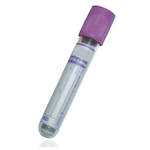Suitable Specimen Types
- EDTA Plasma
Specimen Transport
Transport to Laboratory ASAP.Sample Processing in Laboratory
Store frozen and transport to referral laboratory on dry ice.Sample Preparation
Separate plasma ASAP and store frozen.Fibroblast growth factor 23 (FGF-23)
General Information
Fibroblast growth factor 23 (FGF-23) is a recently discovered growth factor produced by osteocytes and behaving as a hormone in phosphate homeostasis.1 FGF-23 decreases phosphate reabsorption in the kidney by down-regulating the expression of sodium-phosphate co-transporters in the proximal tubule. Moreover, FGF-23 inhibits 1a-hydroxylase expression, leading to decreased hydroxylation of 25- hydroxyvitamin D to 1,25-dihydroxyvitamin D. Increased FGF-23 concentrations, due to genetic mutations, cause excessive renal phosphate excretion and inappropriately low plasma 1,25-dihydroxyvitamin D concentrations in several types of hereditary hypophosphatemic rickets. Tumour-induced osteomalacia is a syndrome consisting of hypophosphataemia, due to decreased renal tubular phosphate reabsorption, inappropriately low 1,25-dihydroxyvitamin D, myopathy and osteomalacia, caused by tumour production of FGF-23.
Patients undergoing haemodialysis often have both increased serum phosphate and FGF-23 concentrations. FGF-23 concentrations in these patients appear to be independently associated with mortality.
Taken from Heijboer et al., Ann Clin Biochem 2009; 46: 338–340
Patient Preparation
It is recommended that the patient is fasted.
Reference Range
Provided by referral laboratory.
Specifications
- EQA Scheme?: No
